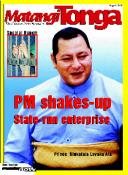
From Matangi Tonga Magazine Vol. 17, no. 2, August 2002.
Government has adopted a two-edged approach to its economic reform program.
In April, the Minister of Finance, Hon. Siosiua ‘Utoikamanu launched the government’s $10 million Economic and Public Sector Reform Program and spelled out the objective, which in a nutshell is to make the Public Servants more efficient and more productive, thereby establishing a platform to boost the development of the private sector, which in turn should provide job opportunities for the growing unemployment of youth in Tonga.
Three months later, in early July, the Prime Minister Prince ‘Ulukalala Lavaka Ata restructured the Royal Tongan Airlines, forming a smaller Board of Directors and hiring a new Chief Executive Officer. The Prime Minister promised that this was the start of the reforms. He warned that he would step into any boards and government departments if they did not produce good results, and take similar action to protect the investment of the tax-payers.
Offers hope
The restructuring of RTA, the introduction of a freight-only air service, and the opening up of new trade routes to Asia, Europe, and the USA mainland, offers hope for the development of the three industries that Tonga, for years, has been dreaming about exploiting, namely fisheries, tourism and agriculture.
With reform becoming a buzz-word in Tonga at the moment there are a few questions that need to be answered by Government.
Firstly, why does it cost $10 million in loan funds to make public servants more productive and to work more efficiently? Surely it is the responsibility of all public servants to be productive and efficient? If they are neither of these things, then they should not be there at all. It seems that government plans to entice them to be productive and more efficient by paying them more—but will it work? In the end what are we going to get for our money?
With regard to the development of the private sector in Tonga, it has never been easy to be in the private sector, particularly in a small market such as Tonga. But the introduction of the concept of a Global Economy, puts the pressure on government to privatise its commercial enterprises as a way of attaining productivity and efficiency, and hopefully more profit, to allow further expansion and more job opportunities. This sequence of events does not seem to have ever worked out in Tonga. So far, once a government enterprise is privatised, a high percentage of people go into redundancy, and the golden land of profitability and more job opportunities seem so far away on the horizon, while unemployment continues to mount.
The opening up of a new air route to the market place of Asia, Europe and the USA definitely offers hope for the further development of our base industries of Fisheries, Agriculture and Tourism. This brings us to the next question. Why not invest the $10 million in fisheries and encourage more Tongans to get involved in this one industry that has the potential to expand and to offer an enormous number of job opportunities?
Neglected
The need for jobs has never been more urgent. House-breaking by youths is a growing concern. Dozens of neglected Tongan children, convicted of theft, are currently overwhelming the under-funded prison system, to such an extent that they are now being taken and isolated on a remote island—where we can only hope that they are learning how to fish. Reform of the Rights of the Child is not on the agenda, while even the churches are engrossed with the public arguments over the rights of civil servants.
Right decision
While the emphasis at the moment is on economic reform, other areas such as political reform should not be overlooked, but at the same time we should take note of the result of reforms that have been adopted in other countries. If we compare the choice of the Russians to adopt a Political Reform first, to the decision by the Chinese to adopt an Economic Reform first, it is not hard to see who made the right decision. With Tongan politics calling for reform at home, we should remember that, without a doubt, international doors of opportunities are opened to us only because the King speaks for us. Without the Monarch we will become just another Pacific Island country, struggling for attention in the outside world.



